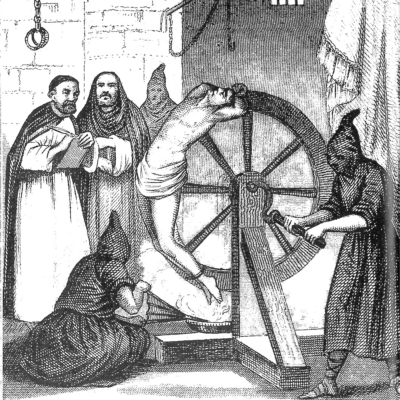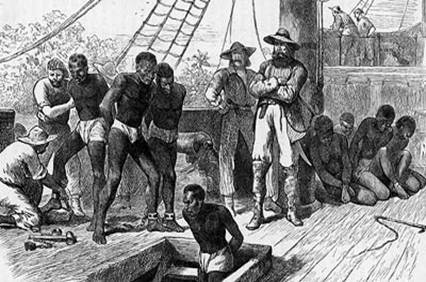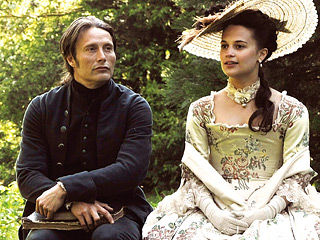Forbidden Love (PART 2 OF 3)
Divorce
In 1772, the king's marriage with Caroline Matilda was dissolved by divorce.
Struensee, following a deluge of modernising and emancipating reforms, was arrested and executed the same year.
Christian signed Struensee's arrest and execution warrant under pressure from his stepmother, Queen Juliane Marie, who had led the movement to have the marriage ended.
Image may be NSFW.
Clik here to view.

(struenseex.gif)
<iframe width="420" height="315" src="//www.youtube.com/embed/2MvsGLVfMJU?feature=player_detailpage" frameborder="0" allowfullscreen></iframe>
Caroline Matilda, retaining her title but not her children, eventually left Denmark in exile and passed her remaining days at Celle Castle in her brother's German territory, the Electorate of Hanover.
She died there of scarlet fever on 10 May 1775, at the age of 23.
Christian's marriage with Caroline Matilda produced two children: the future King Frederick VI and Princess Louise Auguste.
However, it is widely believed that Louise was the daughter of Struensee—portrait comparisons tend to support this hypothesis.
Later life
Christian was only nominally king from 1772 onwards.
Between 1772 and 1784, Denmark was ruled by Christian's stepmother Queen Dowager Juliane Marie, his half-brother Frederick and the Danish politician Ove Høegh-Guldberg.
From 1784 onwards, his son Frederick VI ruled permanently as a prince regent.
This regency was marked by liberal and agricultural reforms, but also by the beginning of the disasters of the Napoleonic Wars.
Death and succession
Christian died at age 59 of a stroke on 13 March 1808 in Rendsburg, Schleswig.
Rumors began that the stroke was caused by fright at the sight of Spanish auxiliaries, which he took to be hostile, but Ulrik Langen, in his biography of the king, did not indicate that there was any external cause.
He was buried in Roskilde Cathedral and was succeeded by his son Frederick VI.
SOURCE: "Christian VII of Denmark"
From Wikipedia, the free encyclopedia
Image may be NSFW.
Clik here to view.

Kato, tell me. How come you think Christian VII was NOT really a mad man?
Image may be NSFW.
Clik here to view.

First of all, the earlier accounts say that Christian VII had a winning personality and considerable talent.
But, Kato, they also say, he was poorly educated, systematically terrorized by a brutal governor, the Count of Reventlow.
That's right. Christian VII might've looked like a mad man because he suffered from severe emotional problems caused by the brutal governor, I suppose. So he appeared to be a crazy man for the eyes of an unknowing person.
I see...
Secondly, in 1769 Christian VII invited the Hungarian astronomer Miksa Hell (Maximilian Hell) to Vardø, a town and the administrative centre of Vardø Municipality in Finnmark county, Norway.
How come?
Obviously, Christian VII was interested in astronomy. Otherwise, he wouldn't invite the astronomer in the first place. This event clearly tells you that at the age of 20, Christian VII had a winning personality and considerable talent.
And what did the astronomer did in Norway?
He observed the transit of Venus, and his calculations gave the most precise calculation of the Earth–Sun distance to that date---approximately 151 million kilometres.
I see. So, Kato, you think that Christian VII was a man of some intelligence, don't you?
I suppose so. If Christian VII had been insane, he wouldn't have taken any interest in astronomy.
Then, how come people in those days considered him to be a mad man?
There are two reasons, I suppose. Firstly, Christian VII was a liberal man who hated a traditional way of life. In other words, he might have been considered a libertine. In this sense, Christian VII had been getting along quite well with Struensee, who was liberal-minded. Actually, Struensee introduced widespread progressive and liberal reforms such as:
Image may be NSFW.
Clik here to view.

(torture2.gif)
•abolition of torture
•abolition of unfree labor (corvée)
•abolition of the censorship of the press
•abolition of the practice of preferring nobles for state offices
•abolition of noble privileges
•abolition of "undeserved" revenues for nobles
•abolition of the etiquette rules at the Royal Court
•abolition of the Royal Court's aristocracy
•abolition of state funding of unproductive manufacturers
•abolition of several holidays
•introduction of a tax on gambling and luxury horses to fund nursing of foundlings
Image may be NSFW.
Clik here to view.

(slave80.jpg)
•ban of slave trade in the Danish colonies
•rewarding only actual achievements with feudal titles and decorations
•criminalization and punishment of bribery
•re-organization of the judicial institutions to minimize corruption
•introduction of state-owned grain storages to balance out the grain price
•assignment of farmland to peasants
•re-organization and reduction of the army
•university reforms
•reform of the state-owned medical institutions.
Image may be NSFW.
Clik here to view.

These are all admirable decisions even to the eyes of the present-day people like you and me.
Image may be NSFW.
Clik here to view.

I see... So, you think, Christian VII was a liberal-minded, rather modern man, huh?
That's right.
And what is the second reason for the king's insanity?
Well... The forbidden love between the queen and the king's personal phycisian was so scandalous that the Danish government might have made up a "reasonable and acceptable motive" for the queen to have relation with the other man.
Image may be NSFW.
Clik here to view.

(royal003.jpg)
<iframe width="500" height="350" src="//www.youtube.com/embed/GIYOJLS5gto?feature=player_detailpage" frameborder="0" allowfullscreen></iframe>
Image may be NSFW.
Clik here to view.

Kato, are you saying, the government told the citizens that the king was a mad man so that the neglected and lonely queen drifted into an affair with Struensee. Is that it?
Image may be NSFW.
Clik here to view.

Yes, I believe so. That's the reason people came to believe that the king was a mad man.
Image may be NSFW.
Clik here to view.

(laugh16.gif)
(To be followed)